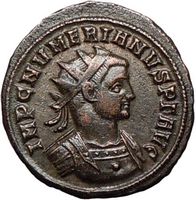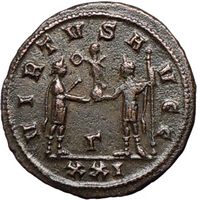Numerian Roman Emperor 282-284AD
Biography and Ancient Coins
Available Online to Buy and Collect
Buy authentic coins of
Numerian Roman Emperor 282-284AD
Every coin comes with it's own custom-made, unique certificate of
authenticity $50-$100 value, absolutely free, a lifetime
guarantee of authenticity, professional research photograph and history.
You can also explore explore a selection of
thousands of certified authentic ancient Greek, Roman, Biblical,
Byzantine coins, artifacts and beyond at a trusted eBay
online coin shop
Also you can watch the video below


Example of Authentic Ancient
Coin of:
Numerian - Roman Emperor: December 283 November,
284 A.D. -
Silvered Bronze Antoninianus 21mm (4.15 grams) Siscia mint circa 283-284
A.D.
Reference: RIC 467; Cohen 110.
IMP C NVMERIANVS P F AVG, radiate, draped & cuirassed bust right
VIRTVS AVGG, emperor standing right receiving Victory on a globe from
Carus standing opposite,
Γ between, XXI in ex.
In
Roman mythology,
Jupiter or Jove was the
king of the gods, and the god of
sky and
thunder. He is
 the
equivalent of
Zeus in the
Greek pantheon. He was called
Iuppiter (or Diespiter) Optimus Maximus ("Father God
the Best and Greatest"). As the patron deity of
ancient Rome, he ruled over laws and
social order. He was the chief god of the
Capitoline Triad, with sister/wife
Juno. Jupiter is also the father of the
god
Mars with Juno. Therefore, Jupiter is
the grandfather of
Romulus and Remus, the legendary
founders of Rome. Jupiter was venerated in
ancient Roman religion, and is still
venerated in
Roman Neopaganism. He is a son of
Saturn, along with brothers
Neptune and
Pluto. He is also the brother/husband
of
Ceres (daughter of Saturn and mother of
Proserpina), brother of
Veritas (daughter of Saturn), and
father of
Mercury. the
equivalent of
Zeus in the
Greek pantheon. He was called
Iuppiter (or Diespiter) Optimus Maximus ("Father God
the Best and Greatest"). As the patron deity of
ancient Rome, he ruled over laws and
social order. He was the chief god of the
Capitoline Triad, with sister/wife
Juno. Jupiter is also the father of the
god
Mars with Juno. Therefore, Jupiter is
the grandfather of
Romulus and Remus, the legendary
founders of Rome. Jupiter was venerated in
ancient Roman religion, and is still
venerated in
Roman Neopaganism. He is a son of
Saturn, along with brothers
Neptune and
Pluto. He is also the brother/husband
of
Ceres (daughter of Saturn and mother of
Proserpina), brother of
Veritas (daughter of Saturn), and
father of
Mercury.
Marcus Aurelius Numerius Numerianus (d. November, 284), known
in English as Numerian, was a
Roman Emperor (December 283 November,
284), together with his brother
Carinus. They were sons of
Carus, a
Gaul raised to the office of
praetorian prefect under Emperor
Probus in 282.
In 282, the legions of the upper Danube in
Raetia and
Noricum proclaimed Numerian's father,
the
praetorian prefect Marcus Aurelius
Carus, emperor, beginning a rebellion
against the emperor Probus. Probus' army, stationed in
Sirmium (Sremska
Mitrovica,
Serbia), decided they did not wish to
fight Carus, and assassinated Probus instead. Carus, already sixty,
wished to establish a dynasty; and immediately elevated Carinus and
Numerian to the rank of
Caesar.
In 283, Carus raised Carinus to the title Caesar, left him in charge
of the West, and moved with Numerian and his praetorian prefect
Arrius Aper to the East, to wage war
against the
Sassanid Empire. (The Sassanids had
been embroiled in a succession dispute since the death of
Shapur, and were in no position to
oppose Carus' advance.) According to
Zonaras,
Eutropius, and
Festus, Carus won a major victory
against the Persians, taking
Seleucia and the Sassanid capital of
Ctesiphon (near modern
Al-Mada'in,
Iraq), cities on opposite banks of the
Tigris. In celebration, Numerian, Carus,
and Carinus all took the
title Persici maximi. Carus died
in July or early August, reportedly due to a strike of lightning.
Carus' death left Numerian and Carinus as the new Augusti. Carinus
quickly made his way to Rome from Gaul, and arrived in January 284.
Numerian lingered in the East. The Roman retreat from Persia was orderly
and unopposed, for the Persian King,
Bahram II, was still struggling to
establish his authority. By March 284 Numerian had only reached Emesa (Homs)
in
Syria; by November, only Asia Minor. In
Emesa he was apparently still alive and in good health, as he issued the
only extant
rescript in his name there. (Coins are
issued in his name in
Cyzicus at some time before the end of
284, but it is impossible to know whether he was still in the public eye
by that point.) After Emesa, Numerian's staff, including the prefect
Aper, reported that Numerian suffered from an inflammation of the eyes,
and had to travel in a closed coach. When the army reached
Bithynia, some of Numerian's soldiers
smelled an odor reminiscent of a decaying corpse emanating from the
coach. They opened its curtains. Inside, they found Numerian, dead.
Aper officially broke the news in
Nicomedia (İzmit)
in November. Numerian's generals and tribunes called a council for the
succession, and chose
Diocles, commander of the cavalry arm
of the imperial bodyguard, emperor, in spite of Aper's attempts to
garner support. On November 20, 284, the army of the east gathered on a
hill 5 km
(3.1 mi)
outside Nicomedia. The army unanimously saluted their new Augustus, and
Diocles accepted the purple imperial vestments. He raised his sword to
the light of the sun, and swore an oath denying responsibility for
Numerian's death. He asserted that Aper had killed Numerian and
concealed it. In full view of the army, Diocles drew his blade and
killed Aper.
According to
Historia Augusta, Numerian was a
man of considerable literary attainments, remarkably amiable and known
as a great orator and poet. However, no other sources, apart from the
unreliable Historia, report anything about his personality.
Marcus Aurelius Carus (c. 230 - late
July/early August, 283) was a
Roman Emperor (282-283). During his
short reign, Carus tried to follow the path of restoration of the empire
strength marked by
Aurelian and
Probus. His sons
Carinus and
Numerian formed, with Carus, a short
lived dynasty, which granted further stability to a resurgent empire. He
also had a daughter Aurelia Paulina.
Biography
Carus, whose name before the accession may have been
Marcus Numerius Carus, was born, probably, at
Narbo (modern Narbonne) in Gaul,[1]
but was educated at
Rome. He was a
senator, and had filled various civil
and military posts before he was appointed
prefect of the
Praetorian Guard by the emperor Probus
in 282. After the murder of Probus at
Sirmium, Carus was proclaimed emperor
by the soldiers. Although Carus severely avenged the death of Probus, he
was himself suspected of having been an accessory to the deed. He does
not seem to have returned to Rome after his accession, but contented
himself with an announcement of the fact to the Senate.
Bestowing the title of
Caesar upon his sons Carinus and
Numerian, he left Carinus in charge of the western portion of the
empire, and took Numerian with him on the expedition against the
Persians which had been contemplated by
Probus. Having defeated the
Quadi and
Sarmatians on the
Danube, Carus proceeded through
Thrace and
Asia Minor, annexed
Mesopotamia, pressed on to
Seleucia and
Ctesiphon, and carried his arms beyond
the
Tigris. The
Sassanid Emperor
Bahram II limited by internal
opposition, could not effectively defend his territory. For his
victories, which avenged all the previous defeats suffered by the Romans
against the Sassanids, Carus received the title of Persicus Maximus.
Carus hopes of further conquest were cut short by his death. One day,
after a violent storm, it was announced that he was dead. His death was
variously attributed to disease, the effects of
lightning, or a wound received in a
campaign against the
Persians. The facts that he was leading
a victorious campaign, and that his son Numerian succeeded him without
opposition, suggest that his death may have been due to natural causes.
|